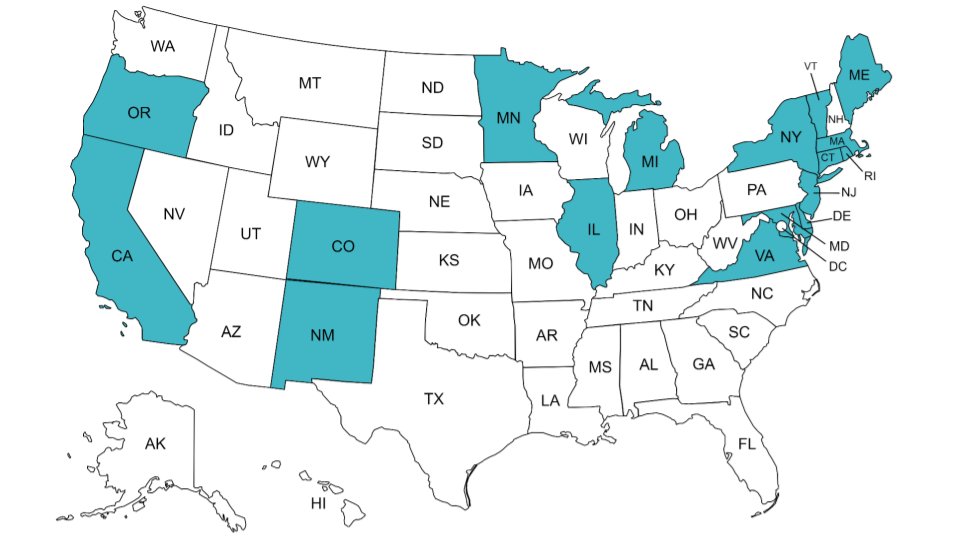
The Latest
Preventive Services Hub
Preventive Services Hub
The Affordable Care Act’s preventive services mandate requires most private health plans to provide people with access to preventive services – including cancer screenings, immunizations, contraception, and behavioral health assessments – at no cost.
The Kennedy v. Braidwood case seeks to challenge the mandate by threatening to eliminate free access to critical preventative care services for more than 150 million people, including approximately 37 million children.
Click here for the latest update.
Mapping ACA Protections
All preventive services bills introduced since the initial Braidwood v. Becerra District Court decision.
Click here for the States Safeguarding Preventive Services map.
The map below is created by an automated system that pulls bills based on a keyword search. Some relevant bills may be inadvertently included/excluded on the map and will be manually corrected periodically.
Click here for the States with Laws Protecting Cost-Free Access to Preventive Services map.

BRAIDWOOD SUPREME COURT UPDATE
On Friday, January 10, the Supreme Court announced it planned to take up the Kennedy v. Braidwood Management inc. court case, with oral arguments likely scheduled for April with a final decision expected in late June or early July. Late last year, both the plaintiffs and defendants in the case appealed a Fifth Circuit Court of Appeals decision that was described by many as a “mixed bag.” While the Circuit Court decision kept in place the Affordable Care Act’s no-cost preventive services mandate in place, a future Supreme Court ruling could affect more than 150 million people’s access to critical preventive services recommended by the US Preventive Services Task Force, such as cancer screenings and HIV prevention medication.
In February 2025, USofCare led a group of 47 other health advocacy organizations in voicing our support for cost-free preventive care in an amicus brief to the Supreme Court. We urge the Court to continue to support the no-cost mandate and ensure that people have the care they need when they need it.
View our briefing on the Braidwood decision and its potential impacts on access to critical preventive care.
Resources
Below, you can find a frequently updated list of USofCare and partner resources about the Braidwood case, how it impacts consumers, and what partners and policymakers can do to ensure that people have free access to preventive services.
Click here for FAQs, Talking Points, Fact sheets, Testimonies, and more!
Submitted Testimony
2024
2023
2023
Additional Resources
Legal
The O’Neill Institute’s Health Care Litigation Tracker includes detailed information on the Braidwood case, including a list of major filings, amicus briefs, and more. Select filings can also be found below:
Research
American Journal of Law & Medicine:
Briefings and Webinars
Braidwood v. Becerra: The Private Sector’s Role in Protecting Preventive Services
(June 26, 2024)
Braidwood v. Becerra: An Update and Overview to Support State Advocacy
(June 6, 2023):
- View the English-language transcript
- View the Slide Deck
Partner Resources
Center for Health Law and Policy Innovation:
- Braidwood Management v. Becerra: Frequently Asked Questions for Healthcare Advocates and Providers
- Fifth Circuit’s Decision in Braidwood v. Becerra: A ‘Mixed Bag’
Georgetown Center on Health Insurance Reform (CHIR) Blog:
Community Catalyst:
Health Affairs Forefront:
Center for Value-Based Insurance Design (V-BID):
- Chart on the Use of Pre-ACA USPSTF Recommendations
- Braidwood Resources
- Clinical and Equity Implications Brief and Infographic
Center for American Progress (CAP)
Previous Braidwood Posts
September 20:
This is a fact sheet outlining the Braidwood decision would affect people’s access to care.
September 14:
CHART: 2023 USPSTF Recommendations Impacted by Braidwood Decision
This chart breaks down the various services recommended by the US Preventive Services Task Force and how they’d be affected by the Braidwood decision.
March 30:
United States of Care Issues Statement in Response to Ruling in Braidwood Management v. Becerra Case
This is USofCare’s CEO & Co-Founder’s official statement on Braidwood v. Becerra
March 21:
FACT SHEET: No-Cost Preventive Services Affected by Braidwood Decision
This is a 2-page PDF that shows which preventive services might be affected by Braidwood